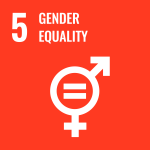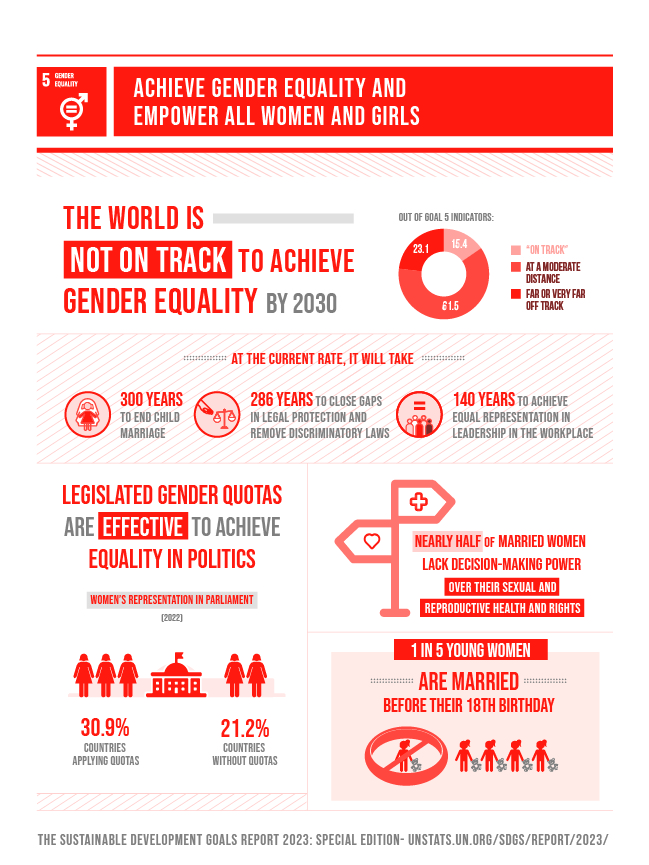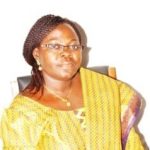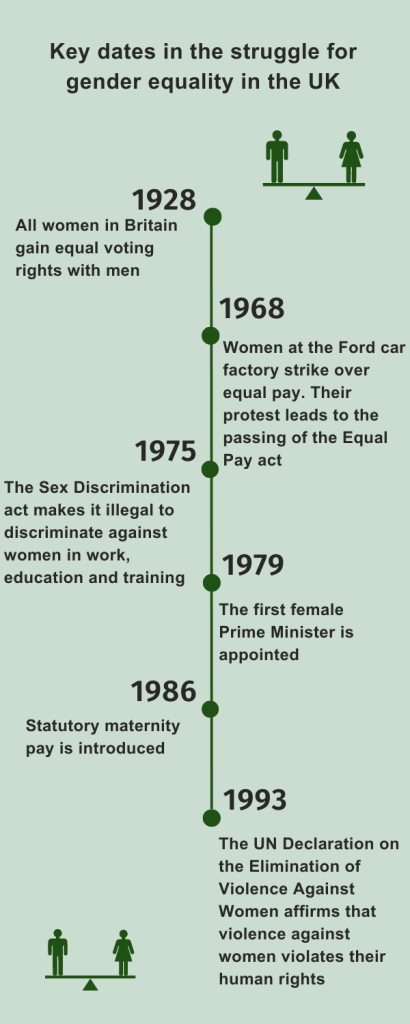Unit 5 Opportunity: SDG5
Gender Equality

Goal no. 5 of the 2030 Agenda for Sustainable Development aims to achieve gender equality and empower all women and girls.
Click on the arrows to reveal more information about SDG5. You don’t need to remember everything you read – the main thing is to get an overview of this Goal.
Information and targets reproduced under the terms and conditions of United Nations websites. Copyright (2023).
A reminder that links in this e-book do not open in a new tab. If you click on any of the links to a webpage, click the back button in your browser to return here.
Key vocabulary
Check that you know the meaning and the whole word family of these key words before you begin the Unit. (NOTE: there may be other versions of the word forms – these are the common forms in the context of SDG 5). Also notice some common collocations in bold in the ‘Why this goal? and ‘Targets’ sections above. Add any new words, word families or collocations that you would like to remember to your vocabulary book.
Verb Noun Noun person Adjective
gender gendered
To be equal/equalise equality equal
To represent representation representative representational
To empower empowerment empowered
To discriminate discrimination discriminatory
Introduction
Section 2 of Develop Your English is about the life chances of adults and children at different ages and in different parts of the world and looks at various factors that can affect the opportunities open to them. In this Unit you’ll learn how a person’s gender affects their life chances.
In your local context…
- Do women have the same opportunities as men? Are there many prominent women in government, business, or media positions?
- Is women’s work recognised? The charity Oxfam estimates the unpaid work of millions of women across the world annually at $10 trillion.
- According to the World Health Organisation ‘The chances of being food-insecure are higher for women than men in every continent, with the largest gap in Latin America’. Is this negative interaction between SDG5 Gender Equality (the focus of this Unit) and SDG2 Zero Hunger evident in your context?
Data visualisation – Achieve gender equality and empower all women and girls
Gender equality is not only a fundamental human right, but a necessary foundation for a peaceful, prosperous and sustainable world. There has been progress over the last decades, but the world is not on track to achieve gender equality by 2030. Read the infographic and complete the summary below. (Click here to see the infographic full screen).

Download the transcript here: Unit 5 Infographic
Reading – Okonjo-Iweala in the WTO top job: breaking the glass ceiling is a win for all women
Before you read – Predict
In the article below, Monica Orisadare, Assistant Professor of Economics at Obafemi Awolowo University Nigeria, talks about the appointment of Dr Ngozi Okonjo-Iweala to the post of Director General of the World Trade Organisation (WTO) in 2021 – the first woman and the first African to be appointed to this role. Read the 5 questions below (which form the headings in the text) that the interviewer asks Professor Orisadare, and predict what you think her responses will be. Write your predictions in the text boxes below.
Skim read
When you have written your predictions skim read the text (max 3 mins) to see if they are accurate. Make any changes that you need to. When you have finished click the ‘check’ button and then ‘show solution’ to see suggested answers.
Vocabulary – Verb+noun partners
There are 3 word partnerships in the text associated with leadership. Do the matching task, and if the collocations are new to you, guess their meaning in the context of gender equality. Use the online dictionary to check if you need to.
Read for detail
Read the article again in more detail. When you have finished decide which ONE of the targets for SDG 5 Dr Ngozi Okonjo-Iweala’s appointment best illustrates.
- Target 5.1 – End all forms of discrimination against all women and girls everywhere.
- Target 5.2 – Eliminate all forms of violence against all women and girls in the public and private spheres, including trafficking and sexual and other types of exploitation.
- Target 5.3 – Eliminate all harmful practices, such as child, early and forced marriage and female genital mutilation.
- Target 5.4 – Recognize and value unpaid care and domestic work through the provision of public services, infrastructure and social protection policies and the promotion of shared responsibility within the household and the family as nationally appropriate.
- Target 5.5 – Ensure women’s full and effective participation and equal opportunities for leadership at all levels of decision-making in political, economic and public life.
- Target 5.6 – Ensure universal access to sexual and reproductive health and reproductive rights as agreed in accordance with the Programme of Action of the International Conference on Population and Development and the Beijing Platform for Action and the outcome documents of their review conferences.
Okonjo-Iweala in the WTO top job: breaking the glass ceiling is a win for all women

Dr Ngozi Okonjo-Iweala has become the first woman and the first African to be chosen as director general of the World Trade Organisation. The Conversation Africa’s Wale Fatade asks Dr Monica Orisadare, an Assistant Professor of Economics and Director of the Centre for Gender and Social Policy Studies at Obafemi Awolowo University, Nigeria about Okonjo-Iweala’s achievement and what it means.
What does her career rise represent for Nigerian women?
Actually this is a great achievement. Not only from the Nigerian woman’s perspective but the African woman’s perspective as well as women all over the world. Breaking this glass ceiling is an achievement for all women. It means there is still hope, despite what we have on the ground. Data shows that the number of women in positions of power, the number of women as captains of industry, compared to that of men is appallingly low. By 2030 the world is expected to have at least achieved some gender equality as set out in the targets of the Sustainable Development Goals. Most times women feel it’s a difficult feat to achieve. There are lots of women struggling to be heard. And despite their efforts they may feel, well, maybe it can’t be, given the patriarchal nature of the world we live in. But what this appointment shows is that governments, organisations and society still believe in women and that they can still be there at the top to manage affairs.
This achievement is not just a day’s work. It’s a kind of investment that she has nurtured for a long time.
Will it have any impact on women in Nigeria?
I believe it will. It’s a kind of impetus, a kind of encouragement for women here in Nigeria. I know a lot of people, a lot of women who are there putting in the effort in every aspect of life here, either in academia, as captains of industry or in politics, but presently the number the country has is very poor and not encouraging. Nigeria ranks among the least countries in terms of women in parliament. At present, Nigeria has just 3.63% female representation in parliament. This is a far cry from what is needed – the 35% through affirmative action. When you begin to talk about projects, programmes, that will affect women, we are not there yet.
Her appointment means we should not relent in our fight against gender inequality. We should still put in more effort in order to win the fight and be able to get what we want.
How do you feel about the appointment – as a female academic, a gender scholar, and development economist?
What does it say to me? I see focus and many years of hard work.
For me as a development economist and as an academic, I see her as a kind of role model – which she is. In fact she is a mentor to all women struggling to become achievers. She’s strong in her focus. She never gave up, despite the opposition.
I think there are some qualities that she possesses that I learnt from and also respect. Coming from that background, I know that she must have struggled. She must have worked in situations in which there were always more men than women. I can tell you categorically that that’s what it is like in many work places around the world and in my department here in the university. We have about 40 academic staff out of which only four are female.
It’s like that in most of the departments. So if we are getting few women coming on board, it means putting in more effort and not resting on our oars. By pushing a little bit harder we will get to the point where we will stand out – as she has done now.
She stood out among so many others, even among the men. She is a force to be reckoned with and she is somebody worthy of emulation.
For me she stands out as a person, she is a source of strength, somebody I look up to and I want to learn from.
How do you explain her rise? What could have been responsible?
The first is her background. Family background, educational background and her experiences. She had good education, which gives her an edge. And then her experiences at the World Bank and also as a finance minister in Nigeria and later a foreign minister, sitting on boards of so many big organisations. The opportunities she had to experience both worlds of the developed and developing countries which I believe formed her outlook.
I think those are factors – the rich country and the poor country outlook. This could have been a major factor in getting her to where she is now.
Are there tangible benefits Nigeria will derive from her appointment?
Yes, I believe there are.
I will start from the many policies and reforms she helped put in place as a finance minister in Nigeria. She fought corruption. For example spearheading the negotiations with the Paris Club which led to the wiping out of US$30 billion of Nigeria’s debt, and the outright cancellation of US$18 billion. She helped build an electronic financial management platform, the Government Integrated Financial Management and Information System, with the support of the World Bank and the IMF to the Federal Government of Nigeria. She also started the Treasury Single Account and the Integrated Payroll and Personnel Information System, which meant that many ‘ghost workers’ were phased out. Ghost workers are people whose names are on the payroll but are not known to work in the particular organisation. Yet they are paid salaries regularly. By 2019 nearly N200 billion had been saved.
She also initiated a process under which every state had to publish their accounts.
She’s mentioned that she’ll be focused on achieving inclusive growth in raising the standard of living for all. And I believe her perspective, the way she sees things, could be different given her dual citizenship. She’s not only going to serve the interests of the developed world, but also those of low-income countries.
I see her facilitating the kind of positive policies that she has been known for in other positions she held. I also want to have this broad view, that it is not for Nigeria alone, but for low income countries, which covers the whole of Africa, parts of Asia and other low income regions like Latin America. I see her supporting policies that will drive up their economy and also benefits all – both the low income and high-income countries.
NB This version of the article, with permission from the author, does not include the hyperlinks to supporting articles found in the original. Click the title for the full version of the text, published under a CC BY ND licence in The Conversation, which should be used for reference and sharing.
Vocabulary – Compound nouns to describe powerful people
- In Unit 2 you learned some compound adjectives, and in Unit 3 you looked at a wider range of compound words. Below are three compound nouns, taken from the text (‘Okonjo-Iweala in the WTO top job: breaking the glass ceiling is a win for all women’), which describe powerful people.
- Identify a person you know – either personally or someone in public life – who is an example of each of the above.
Vocabulary – Word families
A good way of building your vocabulary range is by learning other members of the word family of any new word you learn. You can also do this for words you already know. When you make a note of a new word in your vocabulary book, look up the members of the word family at the same time, and instead of learning one new word you can learn three or four and they will be stored together in your memory.
Read the words in the table that all appear in the text (‘Okonjo-Iweala in the WTO top job: breaking the glass ceiling is a win for all women’). Do you know their meaning? Use the online dictionary if you need to check. Do you know the whole word family? Test your knowledge and then click the buttons to see if you are right.
Pronunciation – Word stress in word families
In word families it’s common for the word stress to shift between different elements. Read the examples in the table, then play the audio to hear them pronounced. As you listen, highlight the syllable that carries the main word stress. The first one has been done as an example.
Play the audio here.
| Verb | Noun | Noun person | Adjective | |
| 1 | To politicise | politics | politician | political |
| 2 | — | parliament | parliamentarian | parliamentary |
| 3 | To manage | management | manager | managerial |
| 4 | To economise | economy | economist | economic/economical |
Practice
Work in pairs, A and B. Person A reads out one of the word families. Person B looks at the table with the main stresses marked (see answers below) and listens to person A and when they have finished tells them if they have put the word stress in the correct place. Then switch roles so person B reads out the word family and person A listens and gives feedback.
Listening – How to increase the role women play in developing the African continent (4 mins)
![]()
Credit: The Conversation, Pasha 47. Ozayr Patel, Digital Editor. Licence: CC BY NC ND

Before you listen
1. You will hear Roula Inglesi-Lotz talking about the role women can play in science, technology and development on the African continent. She begins by talking about the concept of ‘missing’ women in academia. She says you can calculate how many women are ‘missing’ from academia out of the total number of women in the country if you look at:
-
- How many women were born.
- How many women were educated.
- How many women enter the labour force.
When you do that, it’s clear that the opportunity to engage all of these women in the working environment is not being taken. In your local context are there many women who have completed a university education? If not, what do you think stops them doing so?
2. Look at the word cloud created from the transcript. The most frequently used words (the biggest ones in the cloud) are: women (18); role (5); continent (5); technology (4); science (4). With the title in mind (‘How to increase the role women play in developing the African continent’) create a sentence that uses as many of these words as possible that predicts the main point of the listening.

Listen for detail
Play the audio here.
(Or access The Conversation podcast and listen from start to finish).
First you will hear an academic at the University of Antananarivo in Madagascar explaining why education is so important for women. Listen and make notes in the first text box. Continue listening to Prof. Inglesi-Lotz, and make notes in the other text boxes. Stop and start if the audio if it is helpful.
When you have finished, click the ‘copy’ button to save your notes to your own device. Note that the ‘check’ button does not supply any useful feedback on your writing. Instead, click below to see some suggestions.
Download the transcript here: Listening transcript Unit 5
Grammar – Narrative tenses
Read the timeline that shows a few of the key events in the struggle to gain gender equality in the UK.

Download the transcript here: Unit 5 Infographic transcript
Narrative tenses talk about the past and describe past events, so they are ideal to describe the timeline.
Focus on narrative tenses
The four narrative tenses are the past simple, past continuous, past perfect and past perfect continuous.
1. Use the past simple for actions that started and finished in the past.
When my grandmother was a young woman, she couldn’t vote. In 1928 all women gained equal voting rights.
2. Use the past continuous for background information and to describe a situation that continued for some time.
Throughout much of the 20th century women were working in similar jobs to men but were earning less money.
3. Use the past simple and past continuous together when one action interrupts another.
The women were suffering from a sense of injustice when they went on strike in 1968.
4. Use the past perfect and the past simple together to describe an action that happened before another past action.
The women had decided to fight for equal pay when they began their protest in 1968.
5. Use the past perfect continuous to describe something that has been happening over a long period of time.
In 1928 women had been campaigning for many years to gain voting rights for all women.
Writing
In this Unit you’ve learned about how a person’s gender affects their life chances. Arulrahini lives in Sri Lanka. Her story shows that women are able to achieve excellent results when given the chance, and that working in a women-only cooperative helps them deal with gender-related issues.
Read Arulrahini’s story and write a response to it that incorporates what you know about opportunities and life chances as they relate to SDG5 Gender Equality. Write about:
- The agriculture Development Cooperative that she formed.
- Her experience of being a female farmer.
- How women benefit from working together.
- Any other topic relevant to life chances and SDG5.
Sowing Seeds of Change
“Whenever my brothers visit, they look at my hands and remark that it’s time I rest my hardened hands. I laugh it off. Farming is my passion, it is the lifeline that kept us afloat. Until my last breath, I want to be a farmer.”
Arulrahini started farming at 12 to support her parents who were severely ill. Despite the social pressure telling her otherwise because of her gender, she continued to work in the farm even after marriage at age 26.
In 2017, Arulrahini joined other women, including Nagulan Vijayaluxmi, and formed the Malarum Bhoomi Women’s Agriculture Development Cooperative. With support from both family and the Cooperative, her income has grown significantly.
That same year, she also received an interest free loan to help her grow her farm. “I bought about 500 kilos of onion seeds from the loan, sold the harvest and used the money to expand my farm gradually. Malarum Bhoomi provided me with a second loan to cover the expense to dig another well, so I could engage in farming all-year round without relying only on the rains,” she says.
“We started with 35 members and now are 114 strong. At the onset, there was a lot of pushback from men who did not see the need for an all-women Coop but we were adamant. As a women’s coop we can discuss issues faced by women famers, work towards solutions, support each other, and have a platform to voice our concerns,” says Nagulan Vijayaluxmi.
Department of Economic & Social Affairs Statistics Division (2022) ‘Bringing Data to Life: SDG impact stories from across the globe.’ Available at: https://unstats.un.org/sdgs/report/2022/SDG2022_Flipbook_final.pdf
Speaking – Discussion
In this unit you’ve learned about the ways gender equality (SDG5) and economic outcomes (SDG8) interact and have discovered more about gender equality in leadership. A positive development is the appointment of Dr Ngozi Okonjo-Iweala to the post of Director General of the World Trade Organisation – an appointment which helps meet SDG5 target 5.5 – ‘Ensure women’s full and effective participation and equal opportunities for leadership at all levels of decision-making in political, economic and public life’.
SDG5 summary
Enhancing property rights and access to land and natural resources to women can contribute to reduce gender inequalities, improve their livelihood options and poverty status.
Reproduced with kind permission of the UN Environment Programme. Copyright (2023). All rights reserved.
- We are making very little progress towards reaching goal SDG5 Gender Equality by 2030. More women and girls are being pushed into poverty, some successes are even being reversed and there is a lack of political will or political momentum to address this and a lack of investment. Why aren’t we making more progress towards achieving the aims of SDG5?
- To what extent do you agree with the conclusion of the listening that ‘We need to start considering that women should not just participate in the workforce, but also be able to be the leaders, and make changes for future generations’?
- What is your opinion on the use of quotas to achieve equality?
- Can you give a definition for the words/phrases in bold above?
A reminder that if you have access to the internet and are studying by yourself without other people to practice your spoken English with, you can use artificial intelligence (AI) to gain fluency practice. See here for instructions and prompts.
Here are some prompts related to this Unit:
- ‘Tell me about any prominent women in government, business, or media positions in [insert name of country]. Let’s have a dialogue about these women, and what they have achieved, and why there are so few of them.’
- ‘Tell me about a few of the key events in the struggle to gain gender equality in [insert name of country]. Let’s have a dialogue about how difficult it is to gain gender equality there.’
- ‘Let’s have a dialogue about why we are not making more progress towards achieving the aims of SDG5 Gender Equality.’
Looking Ahead to Unit 6
In Unit 6 you’ll be looking at other types of inequality including income inequality, racial inequality and social inequality. Do you have experience of any of these?
Use the menu bar on the left-hand side of the screen to access Unit 6

